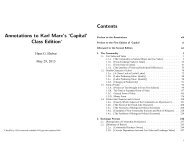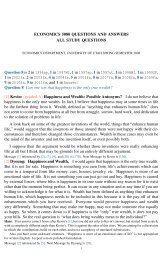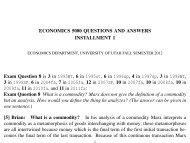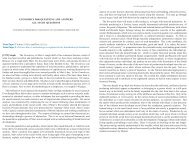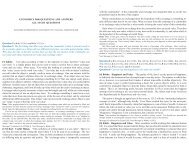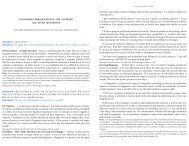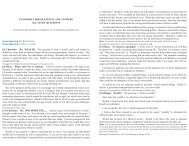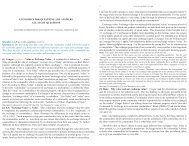Question 1 What did Marx mean with his formu - University of Utah
Question 1 What did Marx mean with his formu - University of Utah
Question 1 What did Marx mean with his formu - University of Utah
Create successful ePaper yourself
Turn your PDF publications into a flip-book with our unique Google optimized e-Paper software.
U <strong>of</strong> <strong>Utah</strong> Econ 5080 2005fa 55<br />
Message [1871] referenced by [2007SP:456]. First Message by Bubba is [142].<br />
[1917] ADHH: graded A– The value <strong>of</strong> a commodity does not increase when produced by<br />
a slow laborer because value is calculated using the socially necessary labor time required<br />
to produce that commodity. There is no difference between the value <strong>of</strong> the same commodity<br />
made by a slower laborer or a more efficient one. The commodities will both end up<br />
<strong>with</strong> the same value. According to Citrus [1996ut:177-4], the market values <strong>of</strong> all similar<br />
commodities are the same.<br />
Society as a whole decides to keep the value <strong>of</strong> the output below the time actually used.<br />
Both the buyers and the sellers have accepted the exchanges that occur in their markets as<br />
fair. Enforcement occurs when the buyer pays the same price for a desk that took 12 hours<br />
to be assembled by a slow laborer as he does for a similar desk that took only 7 hours to be<br />
assembled by a more efficient laborer.<br />
Hans: Thank you for digging out the excellent Citrus reference.<br />
How <strong>did</strong> you get the idea that society decides to keep the value <strong>of</strong> the output below the time actually used? Is it<br />
because the workers don’t get paid a full equivalent <strong>of</strong> the value they produce? These too-low wages do not prevent<br />
the capitalists from charging full price when they sell their products.<br />
Citrus’s answer to “who decides” is: we all decide because we allow markets to run their course.<br />
Final Grading Note by Hans: Very good contributions to the discussion.<br />
Message [1917] referenced by [1922], [2007SP:76], [2007SP:456], and [2007SP:529]. First Message by ADHH is<br />
[99].<br />
[1922] Tink: graded B+ The value <strong>of</strong> a commodity does not increase if it is made by a slow<br />
or inept laborer because the value <strong>of</strong> a commodity is determined by the socially necessary<br />
labor time, as ADHH described in [1917]. The socially necessary time is an average, thus<br />
the product <strong>of</strong> a slow or inept laborer does not increase in value, just as the product <strong>of</strong> a<br />
very fast or efficient laborer does not decrease. As more and more laborers produce, the<br />
discrepencies <strong>of</strong> their labor time and efficiency evens out, and the “socially necessary labor<br />
time” is determined.<br />
ADHH also described how it is society who decides the value <strong>of</strong> the output, which is<br />
kept below the time actually used. When members <strong>of</strong> society engage in an exchange, they<br />
are validating the values that have been assigned to the commodity and thus the labor input<br />
behind it.<br />
Enforcement is the result <strong>of</strong> society as well, as participants in the exchange will pay the<br />
same amount for the same commodity, regardless <strong>of</strong> the production time <strong>of</strong> the individual<br />
laborer who made it. T<strong>his</strong> keeps the value <strong>of</strong> output at the mercy <strong>of</strong> the social average.<br />
Hans: Good and thoughtful re<strong>formu</strong>lation <strong>of</strong> ADHH.<br />
First Message by Tink is [150].<br />
[1933] Mullin: Think no further than the lesson that our parents have tried to teach us for<br />
years: if you want to find who is accountable or responsible for a decision look no further<br />
than the mirror. <strong>What</strong> I <strong>mean</strong> by t<strong>his</strong> is that the value <strong>of</strong> the commodity exchanged in the<br />
market is ultimately determined by society or more personally put, us. How does t<strong>his</strong> pertain<br />
to the question, I will try to explain.<br />
Who is content <strong>with</strong> the pr<strong>of</strong>essor that in the first day <strong>of</strong> class announces that he/she will<br />
be grading on a curve? Generally it isn’t the above average student who consistently scores<br />
high on each assignment and exam. Rather, it is the rest <strong>of</strong> the class who find themselves<br />
56 2005fa Econ 5080 U <strong>of</strong> <strong>Utah</strong><br />
in the middle <strong>of</strong> the pack and in particular those that are usually straggling behind. It is for<br />
t<strong>his</strong> reason that society will not allow the value <strong>of</strong> a commodity to be lower as a result <strong>of</strong> a<br />
slow or inept laborer. We, as a generality, prefer to be compared as an average rather than<br />
individually and t<strong>his</strong> is how the value <strong>of</strong> said commodity is also determined.<br />
As a result the extreme discrepancies in the amount <strong>of</strong> time it takes to produce a commodity,<br />
whether that be extremely slow or fast, becomes negligble as it doesn’t skew the<br />
average great enough to affect the value. Due to t<strong>his</strong> relation each commodity is assigned a<br />
value which is figured upon the amount <strong>of</strong> input that is expected. T<strong>his</strong> expectation is derived<br />
from the socially necessary labor time.<br />
Rather than enforcement I believe a more accurate term would be reinforcement that is<br />
the responsibility <strong>of</strong> the participants <strong>of</strong> the market. When there is no reaction to an exchange<br />
value <strong>of</strong> a commodity regardless <strong>of</strong> the production time, possibly because society is usually<br />
unaware <strong>of</strong> these figures, there is no adjustment to the socially necessary labor time which<br />
determines the value and the value is not affected. As a society we generally like to be<br />
compared to the average, and it is acceptable to be only average, and as such the value <strong>of</strong> a<br />
commodity is not increased due to a slow or inept worker whose production doesn’t affect<br />
the average enough to make a difference.<br />
Hans: Your answer is an excellent example <strong>of</strong> voluntarism: everything, even market outcomes, is explained by the<br />
wills and intentions <strong>of</strong> individuals.<br />
First Message by Mullin is [809].<br />
[1935] Jimmie: graded B The value <strong>of</strong> a commodity is not determined by the actual labortime<br />
<strong>of</strong> the producer. In fact, it is determined by the socially necessary labor time needed to<br />
produce the commodity. T<strong>his</strong> <strong>mean</strong>s that the value <strong>of</strong> the commodity is determined by the<br />
amount <strong>of</strong> time it takes the average producer <strong>of</strong> the commodity to produce it. So, the value<br />
is really kept at its level by society who buy at the average price from the average producer.<br />
Deviations from t<strong>his</strong> value are pushed either towards the median value or are forced out <strong>of</strong><br />
production.<br />
Hans: If society pays a higher price than that corresponding to an average labor content, then more suppliers will<br />
enter the market, until the price falls to the average.<br />
Message [1935] referenced by [1948]. First Message by Jimmie is [131].<br />
[1944] TriPod: According to <strong>Marx</strong> a labor-power that produces twice as fast as the average<br />
also produces twice the value. Therefore the slow or inept worker can not produce more<br />
value <strong>of</strong> a commodity. Every worker is not identical they all have different labor power and<br />
are not equal. I think it is up to the economy in which the innovations are made to determine<br />
the actual time needed for production. I would agree <strong>with</strong> Jimmie that people would be<br />
forced out <strong>of</strong> production if they are slower or inept. Every person must meet a minimum<br />
standard. Everyone needs to be an average.<br />
Message [1944] referenced by [1948]. Next Message by TriPod is [1945].<br />
[1948] COMMI: <strong>Marx</strong> gave an example <strong>of</strong> what happens to slow laborers on page 96 <strong>of</strong><br />
the annotations. Power looms were introduced to England and the given amount <strong>of</strong> labor<br />
time was reduced by one half. The hand-loom weavers continued producing at the same<br />
rate, but t<strong>his</strong> only equaled half <strong>of</strong> the electric powered weavers and the value fell by one<br />
half. Hans goes on to say that the “hand weavers simply cannot coexist”. As Tripod [1944]



